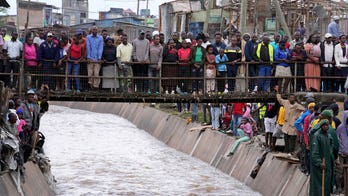Amidst rising costs and concerns about security, a floating pier project off the coast of Gaza intended to facilitate humanitarian aid delivery has drawn scrutiny and raised questions about its effectiveness and long-term implications.

The United States' ambitious project to construct a floating pier off the coast of Gaza to aid the civilian population has been met with growing controversy and security concerns. Initially estimated at $180 million, the project's costs have nearly doubled to $320 million, sparking criticism from lawmakers like Senator Roger Wicker, who has labeled it "ill-conceived" and "dangerous."
The Pentagon has revealed that the pier will only be in operation temporarily, for a period of three months, further raising questions about its effectiveness and the return on investment for American taxpayers. Some experts have expressed concerns about the security risks for U.S. troops stationed off the coast aboard aircraft carriers, who could be vulnerable to attacks from Hamas.

During a House Armed Services budget hearing, Defense Secretary Lloyd Austin assured that U.S. servicemen and women involved in the pier construction will be armed and authorized to return fire if attacked from Gaza. However, the lingering question remains: who will operate the pier once it is complete?
Senior researcher Kobi Michael of the Institute for National Security Studies and the Misgav Institute for National Security and Zionist Strategy warns that Hamas could attempt to sabotage the project if it is not put directly under their control. He highlights the contradiction between the pier project and the U.S. goal of bringing about a ceasefire between Israel and Hamas.

Hamas, which still controls parts of Gaza, has been accused of kidnapping 133 hostages during its October 7 attacks and is demanding their release in exchange for a ceasefire. Pressure on Israel to accept Hamas' demands could mean withdrawing from Gaza territory, which would leave a security void that could jeopardize the pier project.
Lt. Col. Nadav Shoshani, an Israel Defense Forces (IDF) international spokesman, emphasizes the complexity of the JLOTS project due to the war zone location and the massive aid influx. He notes Israel's commitment to the project but stresses the need for security measures, including the inspection of aid in Cyprus, similar to existing operations at Egypt and Jordan crossings.

Jonathan Schanzer, from the Foundation for Defense of Democracies, acknowledges the potential benefits of the Cypriot channel if institutionalized and linked with secure Egyptian borders. He suggests that it could prevent Hamas' re-arming for years and bring stability to the region.
In conclusion, the Gaza pier project faces multiple challenges, including escalating costs, security concerns, and questions about its long-term viability. The project has raised concerns among lawmakers and experts, who question its effectiveness and the potential risks to U.S. troops. The project's broader implications for the ongoing conflict between Israel and Hamas remain unclear, and the question of who will operate the pier after its completion looms large.













